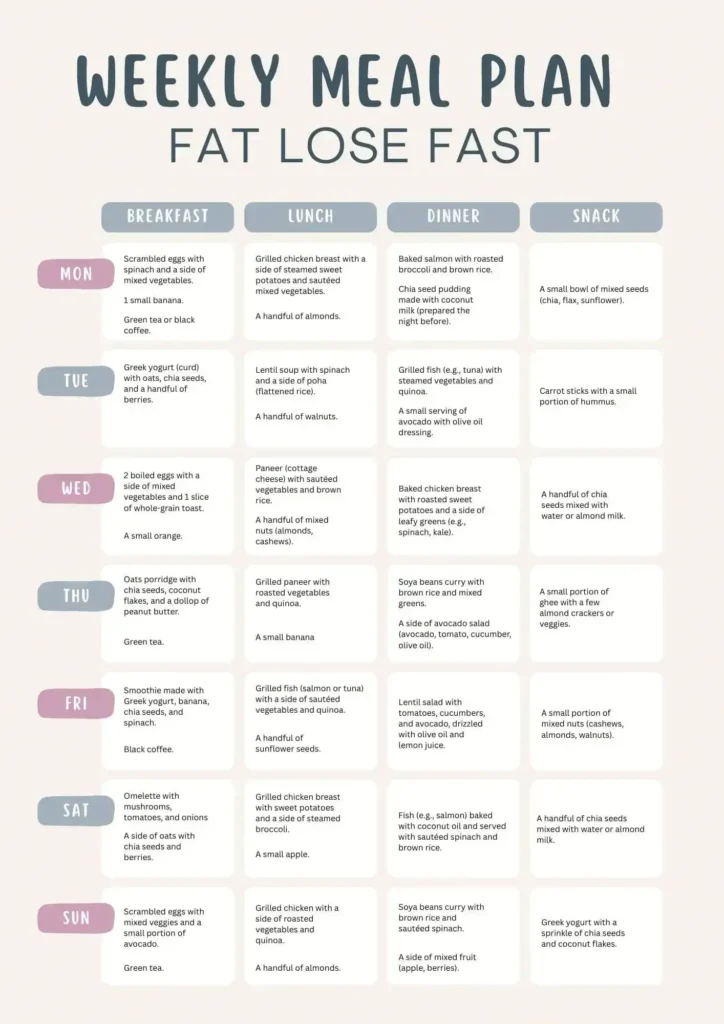When it comes to weight loss, choosing the right foods is crucial. The key is to consume nutrient-dense, high-protein, and healthy fat foods while balancing your carbohydrate intake. This article will explore the best foods for fat loss categorized into carbohydrates, proteins, and healthy fats. We will analyze their nutritional benefits and explain why they are ideal for effective and sustainable weight loss.
Table of Contents
Why Choose These Foods for Fat Loss?
- High Protein Intake Helps preserve muscle mass while in a caloric deficit, promoting fat loss instead of muscle breakdown.
- Healthy Fats – Support hormonal balance, prevent cravings, and boost metabolic function.
- Complex Carbohydrates – Provide sustained energy without causing insulin spikes, reducing fat storage.
- Fiber-Rich Foods – Improves digestion, promotes fullness, and regulates blood sugar levels.
- Essential Micronutrients – Provide necessary vitamins and minerals to support overall health and prevent deficiencies.
By incorporating these foods into your diet, you can achieve a sustainable fat-loss journey while maintaining optimal energy levels and overall well-being. The key is portion control and balance, ensuring you get the right mix of macronutrients without overconsuming calories.
Carbohydrates for Fat Loss
Carbohydrates serve as the body’s primary energy source, supporting physical activity and brain function. Here are some healthy carb choices with their approximate macronutrient content per 100 grams:
- White Rice – Carbs: 28g | Protein: 2.7g | Fat: 0.3g
Provides quick energy and is easy to digest, making it ideal for post-workout meals. - Sweet Potato – Carbs: 20g | Protein: 1.6g | Fat: 0.1g
Rich in fiber, vitamins A and C, and has a low glycemic index, preventing blood sugar spikes. - Bajra (Pearl Millet) – Carbs: 67g | Protein: 11g | Fat: 5g
A gluten-free grain rich in fiber and essential minerals like magnesium and iron. - Brown Rice – Carbs: 23g | Protein: 2.6g | Fat: 0.9g
Contains more fiber and nutrients than white rice, promoting better digestion and satiety. - Poha (Flattened Rice) – Carbs: 76g | Protein: 6g | Fat: 1g
Light and easily digestible, providing instant energy without bloating. - Oats – Carbs: 66g | Protein: 16.9g | Fat: 6.9g
Packed with beta-glucan fiber, reducing cholesterol levels and improving gut health. - Banana – Carbs: 23g | Protein: 1.1g | Fat: 0.3g
Rich in potassium, supporting muscle recovery and hydration. - Mixed Vegetables – Carbs: Varies | Protein: Varies | Fat: Varies
A combination of fiber-rich, vitamin-packed vegetables to support overall well-being.
Protein for Fat Loss

Protein is essential for muscle maintenance, metabolism, and satiety. Here’s the nutritional content of key protein sources:
- Eggs – Protein: 13g | Fat: 11g | Carbs: 1.1g
A complete protein source, containing all essential amino acids for muscle repair. - Chicken Breast – Protein: 31g | Fat: 3.6g | Carbs: 0g
Low in fat and high in lean protein, perfect for muscle-building diets. - Soya Beans – Protein: 36g | Fat: 20g | Carbs: 30g
A plant-based protein powerhouse with heart-healthy benefits. - Paneer (Cottage Cheese) – Protein: 18g | Fat: 20g | Carbs: 1.2g
Rich in casein protein, promoting slow digestion and prolonged satiety. - Lentils – Protein: 9g | Fat: 0.4g | Carbs: 20g
A fiber-rich plant-based protein aiding digestion and heart health. - Fish (e.g., Salmon, Tuna) – Protein: 22g | Fat: 5-15g | Carbs: 0g
Loaded with omega-3 fatty acids, reducing inflammation and boosting brain function. - Sprouts – Protein: 4g | Fat: 0.4g | Carbs: 8g
A low-calorie, high-nutrient food improving digestion and metabolism. - Curd (Yogurt) – Protein: 10g | Fat: 5g | Carbs: 4g
Probiotic-rich, supporting gut health and digestion.
Healthy Fats
Fats are crucial for overall health, supporting brain function, hormone production, and nutrient absorption. Here are the best fat sources:
- Nuts (Almonds, Walnuts, Cashews) – Fat: 50g | Protein: 20g | Carbs: 20g
Rich in heart-healthy monounsaturated fats and essential micronutrients. - Seed Mixture (Chia, Flax, Sunflower) – Fat: 30-50g | Protein: 15-25g | Carbs: 20-40g
Packed with fiber, omega-3s, and antioxidants. - Cold-Pressed Oils (Olive, Coconut, Avocado) – Fat: 100g | Protein: 0g | Carbs: 0g
Contains healthy fats that aid in weight loss and cardiovascular health. - Eggs (Also Listed in Protein) – Fat: 11g | Protein: 13g | Carbs: 1.1g
Provides both protein and essential fatty acids for muscle recovery. - Coconut – Fat: 33g | Protein: 3.3g | Carbs: 15g
Supports digestion and provides quick-burning energy. - Ghee (Clarified Butter) – Fat: 99g | Protein: 0g | Carbs: 0g
Enhances metabolism and contains fat-soluble vitamins A, D, E, and K. - Fish (Also Listed in Protein) – Fat: 5-15g | Protein: 22g | Carbs: 0g
Contains EPA and DHA, crucial for brain and heart health. - Chia Seeds – Fat: 30g | Protein: 17g | Carbs: 42g (30g fiber)
Loaded with omega-3s, fiber, and antioxidants for optimal health.
Weekly Meal Plan

Additional Tips
- Drink plenty of water throughout the day, aiming for at least 8 glasses.
- Consider adding a 10-30 minute walk or light workout to complement the meal plan for fat loss.
- Ensure to get enough sleep for recovery and optimal metabolism.
Negative Health Impacts of Fats

- High Cholesterol & Heart Disease – Consuming too much saturated fat and trans fat can increase LDL (bad cholesterol), leading to a higher risk of heart disease and stroke.
- Obesity & Diabetes – Excess fat intake, especially unhealthy fats, contributes to weight gain, increasing the risk of obesity and type 2 diabetes.
- Inflammation & Insulin Resistance – Processed and unhealthy fats can promote inflammation and insulin resistance, worsening metabolic health.
- Digestive Issues – Consuming excessive fat can lead to digestive discomfort, including bloating, acid reflux, and sluggish digestion.
You Might Like: A Protein-Based Weekly Meal Plan for Better Health
Final Thoughts
Losing fat is not about starvation but about making smarter food choices. Incorporate these foods into your daily meals, balance your macronutrients, and stay active to achieve sustainable fat loss. Focus on whole, nutrient-dense foods to fuel your body and optimize weight loss effectively.

